Choose a shooting mode according to the scene or type of subject.
When the mode dial is rotated to S, the camera automatically optimizes settings to suit the scene.
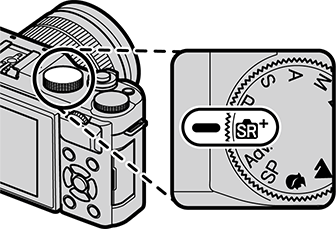
The scene is shown by an icon in the display.
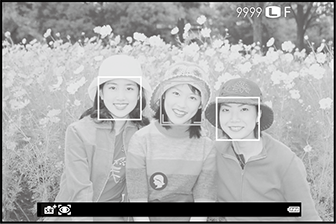
| Icon | Scene |
|---|---|
| a(c) | AUTO |
| d(a) | PORTRAIT |
| c(cc) | LANDSCAPE |
| d(cd) | NIGHT |
| e(ce) | MACRO |
| dd(ad) | NIGHT PORTRAIT |
| g(b) | BACKLIT PORTRAIT |
* The scenes in parentheses are selected if the camera detects that the subject is moving.
The mode selected may vary with shooting conditions. If the mode and subject do not match, select mode P or choose SP and select a scene manually.
Bright Mode
A “bright mode” icon is displayed when the mode dial is rotated to S.

Tap the icon to enable “bright mode” for brighter, more vivid photos.
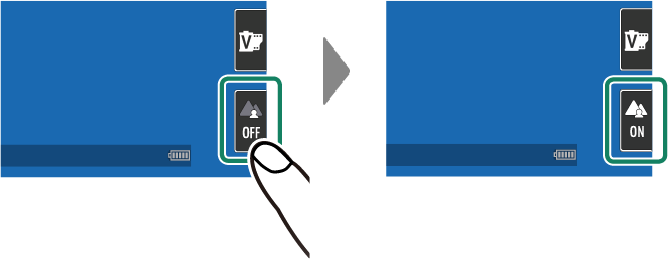
Let the camera choose shutter speed and aperture for optimal exposure. Other values that produce the same exposure can be selected with program shift.
Rotate the mode dial to P.
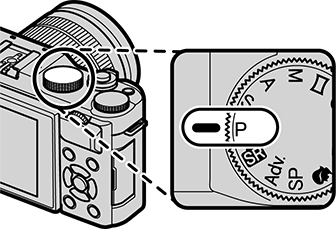
P will appear in the display.
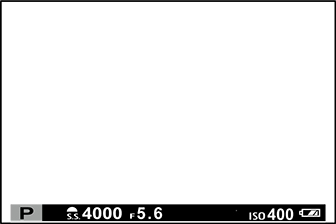
Program Shift
Rotate the sub-command dial to choose the desired combination of shutter speed and aperture (program shift).
Shutter speed
Aperture
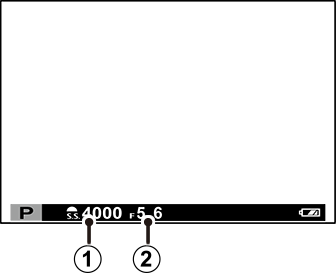
Program shift is not available if the attached flash supports TTL auto, or if an auto option is selected for UDYNAMIC RANGE in the shooting menu.
To cancel program shift, turn the camera off.
Choose a shutter speed and let the camera adjust aperture for optimal exposure.
Rotate the mode dial to S.
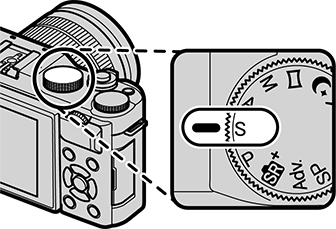
S will appear in the display.
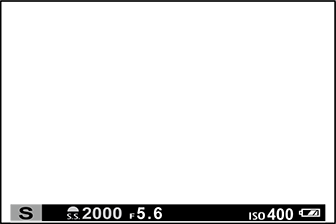
Use the sub-command dial to choose a shutter speed.
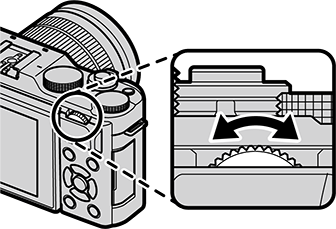
If the correct exposure cannot be achieved at the selected shutter speed, aperture will be displayed in red.
Shutter speeds of 1 s or slower are referred to as “long time-exposures”. Use of a tripod is recommended to prevent the camera moving during the exposure.
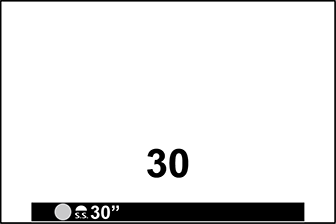
A count-down timer will be displayed while the exposure is in progress.
To reduce “noise” (mottling) in long time-exposures, select ON for KLONG EXPOSURE NR. Note that this may increase the time needed to record images after shooting.
Using a Remote Release
An optional RR-90 remote release can be used for long time-exposures. The RR‑90 connects via the Micro USB (Micro-B) USB 2.0 connector.
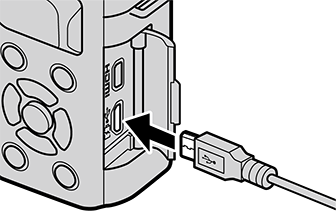
Alternatively, electronic releases from third-party suppliers can be connected via the remote release connector (φ2.5 mm 3-pole mini jack).
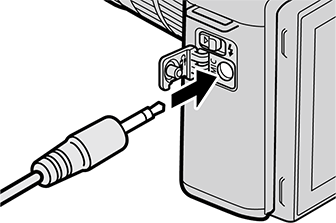
A confirmation dialog will be displayed when a third-party release is connected; press MENU/OK and select REMOTE for WMOVIE SET-UP > MIC/REMOTE RELEASE.
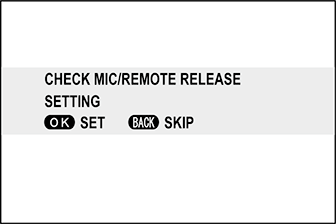
Choose an aperture and let the camera adjust shutter speed for optimal exposure.
Rotate the mode dial to A.
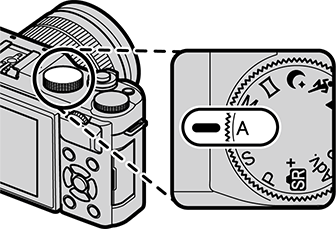
A will appear in the display.
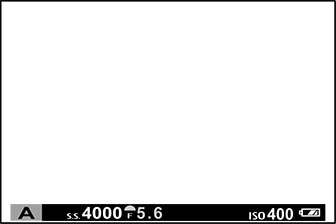
Use the sub-command dial to choose an aperture.

If the correct exposure cannot be achieved at the selected aperture, shutter speed will be displayed in red.
Previewing Depth of Field
When PREVIEW DEPTH OF FIELD is assigned to a function button, pressing the button displays a L icon and stops aperture down to the selected setting, allowing depth of field to be previewed when the view through the lens appears in the display.
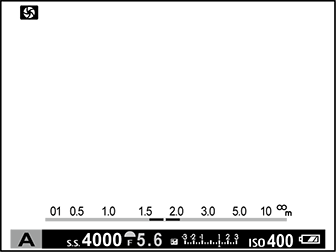
Alter exposure from that selected by the camera.
Rotate the mode dial to M.
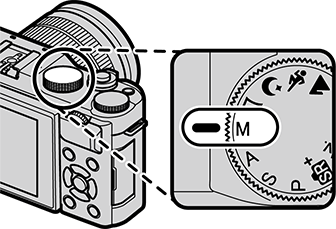
M will appear in the display.
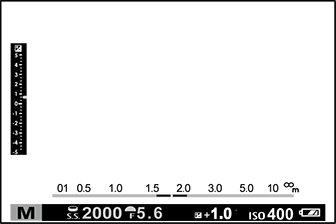
Rotate the main command dial to choose a shutter speed and the sub-command dial to choose the aperture.
The manual exposure display includes an exposure indicator that shows the amount the picture would be under- or over-exposed at current settings.
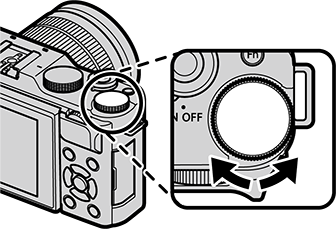
Shutter speed

Aperture
Exposure Preview
To preview exposure in the LCD monitor, select ON for ASCREEN SET-UP > PREVIEW EXP. IN MANUAL MODE. Select OFF when using the flash or on other occasions on which exposure may change when the picture is taken.
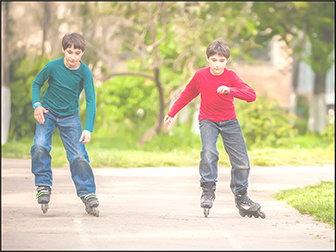
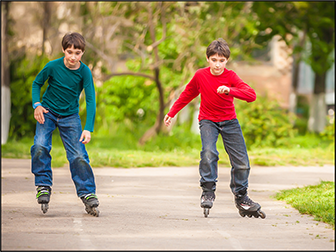
For bulb photography, rotate the main command dial to select a shutter speed of BULB. Use of a tripod is recommended to prevent the camera moving during the exposure.
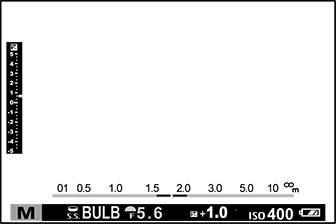
The shutter will remain open for up to 60 minutes, or for 1 second when the electronic shutter is used.
A count-down timer will be displayed while the exposure is in progress.
To reduce “noise” (mottling) in long time-exposures, select ON for KLONG EXPOSURE NR. Note that this may increase the time needed to record images after shooting.
Using a Remote Release
An optional RR-90 remote release can be used for long time-exposures. The RR‑90 connects via the Micro USB (Micro-B) USB 2.0 connector.

Alternatively, electronic releases from third-party suppliers can be connected via the remote release connector (φ2.5 mm 3-pole mini jack).

A confirmation dialog will be displayed when a third-party release is connected; press MENU/OK and select REMOTE for WMOVIE SET-UP > MIC/REMOTE RELEASE.

Follow an on-screen guide to create a panorama (a Panoramas).
The camera offers a choice of “scenes,” each adapted to particular shooting conditions or a specific type of subject.
Rotate the mode dial to SP (SCENE POSITION).
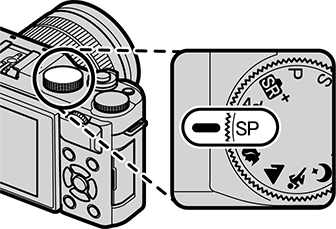
The following scenes can be selected directly using the mode dial:
| Scene | Description |
|---|---|
| hPORTRAIT ENHANCER (Z) | Choose for a smooth skin effect when shooting portraits. If ON is selected for KTOUCH SCREEN SETTING, you can choose the portrait enhancement level using touch controls. |
| MLANDSCAPE | Choose for daylight shots of buildings and landscapes. |
| NSPORT | Choose when photographing moving subjects. |
| ONIGHT+ (o) | The camera automatically optimizes brightness and saturation for night scenes, including shots with portrait subjects. |
Press MENU/OK while the mode description is displayed.
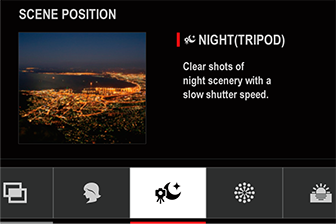
If the view through the lens is displayed in the LCD monitor, press MENU/OK and select ASCENE POSITION in the shooting menu.
Highlight one of the following options and press MENU/OK.
| Scene | Description |
|---|---|
| hPORTRAIT | Choose for portraits. |
| ONIGHT | Choose for poorly lit twilight or night scenes. |
| HNIGHT (TRIPOD) | Choose this mode for slow shutter speeds when shooting at night. |
| pFIREWORKS | Slow shutter speeds are used to capture the expanding burst of light from a firework. |
| QSUNSET | Choose this mode to record the vivid colors in sunrises and sunsets. |
| RSNOW | Choose for crisp, clear shots that capture the brightness of scenes dominated by shining white snow. |
| sBEACH | Choose for crisp, clear shots that capture the brightness of sunlit beaches. |
| UPARTY | Capture indoor background lighting under low-light conditions. |
| VFLOWER | Effective for taking more vivid shots of flowers. |
| WTEXT | Take clear pictures of text or drawings in print. |
| jMULTIPLE EXPOSURE | Create a photograph that combines two exposures (a Multiple Exposures). |
Take photos with filter effects (a Advanced Filters).